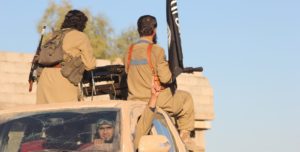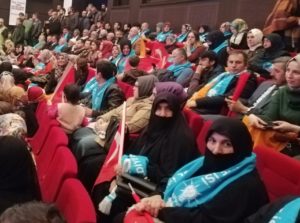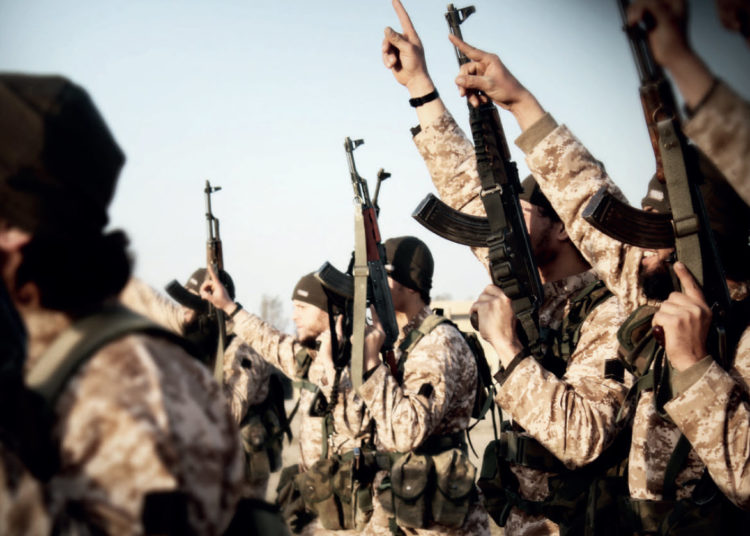Abdullah Bozkurt/Stockholm
Foreign fighters for the Islamic State in Iraq and Syria (ISIS) apparently took refuge in a madrasa located in a conservative neighborhood of Istanbul, stronghold of the ruling Islamists and nationalists in the Turkish government, and used the religious school as a hub to meet others, map out their routes to Syria and discuss strategies, documents obtained by Nordic Monitor have revealed.
An indictment and ensuing trial of an ISIS cell in Turkey have uncovered how jihadists from Russia, Uzbekistan, Azerbaijan and China’s Xinjiang region were trained in a madrasa in Istanbul’s Sultanbeyli district where the ruling Justice Development Party (AKP) has a strong support base. The case, which was initiated in October 2016, involves half a dozen foreign fighters who had operated in and out of Istanbul, with some traveling to the Turkish-Syrian border. Most were released before the trial started, paving the way for some to go underground as fugitives. When asked by the court to locate suspects who were on the run, the Turkish intelligence agency claimed ignorance of their whereabouts.
The testimony of suspects during the hearings shed light on how jihadists networked in Turkey and got their indoctrination at a legally operating madrasa in Istanbul before joining ISIS in Syria. The case suggested Turkish authorities knew the movements of ISIS long before the investigating prosecutor issued detention warrants but decided to turn a blind eye to their activities until the Turkish army entered Syria and faced resistance from armed ISIS groups.
A suspect named Bunyod Babanazarov (aka Muslim), a 31-year-old Uzbek national, told the court on May 9, 2017 that he came to Turkey in May 2016 to attend Quran school and that he was directed to a madrasa in Sultanbeyli. He studied at the madrasa, İhlas İlim, for three months and later moved to an apartment in Pendik with other suspects. He said he was a sports teacher.
Indictment filed against ISIS suspects:
Babanazarov was involved in the recruitment of new militants, according to the indictment. He called for war in a message posted on Telegram, which he claimed he wrote in Uzbekistan before traveling to Turkey. He said in court he did not mean war literally but rather fighting one’s inner evil.
The ISIS cell had long been known to Turkish intelligence, which was monitoring the movements of ISIS but did not act until ISIS militants Babanazarov and Azizjon Bekraev, a 28-year-old Uzbek national, crossed into Turkey from Syria and settled in Istanbul, to carry out a terrorist attack. Babanazarov enlisted himself as a suicide bomber with ISIS leaders, according to the intelligence report in Istanbul Police Department records. On October 22, 2016 police raided two safe houses maintained by ISIS and detained suspects. Some were formally arrested after a month-long detention, while others were released.
Both Babanazarov and Bekraev attended the same madrasa in Sultanbeyli and lived in the same safe house after moving out of the madrasa. Bekraev, who was also known by the assumed name of Zubeyr and worked in construction, ran logistics for ISIS and provided accommodation for militants. Police found a stash of ISIS videos and pictures on his cell phone. He came to Turkey illegally some time in 2015 and trained at the madrasa in Sultanbeyli for two years.

In the first hearing of the trial on February 13, 2017 Bekraev said he was actually a Uyghur from Urumchi, the capital of the Xinjiang Uyghur Autonomous Region. He later assumed Uzbek nationality and moved to Turkey. He told the judges he hid his Chinese nationality from the police, fearing for the safety of his family back in China. He asked the court not to deport him to Uzbekistan because he said the Uzbek authorities would surely hand him over to China.
Navruz Kasymov, 32-year-old Russian national of Kyrgyz origin who used the alias Davut and worked as a cook, also went through ISIS indoctrination at the same madrasa in Sultanbeyli after he flew into Istanbul on February 10, 2016. He moved out of the madrasa to cross into Syria along with 16 other ISIS aspirants including Chinese, Tajik and Algerian nationals. On March 2, 2016 the group was detained by counterterrorism police in Kahramanmaraş province, but he was let go.
Testimony of Bunyod Babanazarov:
An examination of his two cell phones revealed that he saved ISIS materials on them and participated in ISIS groups on Telegram and WhatsApp. The archived chats showed that Kasymov was interested in acquiring weapons and was looking to help secure the release of four ISIS suspects detained in another location near the Turkish border.
Financial records showed that Kasymov received thousands of dollars from Saudi Arabia. One sender was identified as Abulazi Abuduhamidi, an ISIS financier. He claimed in court the money was sent by his brother in Saudi Arabia on one occasion, and on another was sent by an acquaintance of his brother whom he said didn’t know. He went to Syria through Turkey before returning.
Testimony of Navruz Kasymov:
Other ISIS suspects who were indicted in the same case are Nigmatilla Irgashev, 37-year-old Azeri national; Rashad Ismayilov, a 42-year-old Azeri national; Tahir Hudaykulov, a 44-year-old Uzbek national; and Orhan Mustafayev, a 31-year-old Azeri national. The indictment, filed on November 23, 2016, asked the court to convict the suspects and sentence them under counterterrorism laws.

Ismayilov’s chats on his mobile confirmed he had been in contact with many ISIS terrorists and shared messages to support the ISIS campaign. He denied having links to ISIS and claimed he came to Turkey to live as a Muslim man. Asked why he joined a jihadist group with some 200 members who were sharing ISIS messages on social media, he claimed he joined the group for business reasons. His wife was also detained by the police but was quickly released.
Testimony of Azizjon Bekraev:
During the arraignment on November 22, 2016 judge Hasan Basri Savas ruled to release all the suspects except Bakraev and Kasymov. It was shocking to see the court ruling for the release of Babanazarov, listed as a suicide bomber in police records. On January 18, 2017 the panel of judges hearing the case at the 23rd High Criminal Court reversed the decision and issued a new arrest warrant for Babanazarov.
A new arrest warrant issued for Bunyod Babanazarov, an alleged suicide bomber who was released after a previous detention:
After their release, some of the suspects including Ismayilov and Mustafayev never bothered to appear in court for hearings and became fugitives.
The court asked Turkish intelligence agency MIT to locate both Ismayilov and Mustafayev, but MIT legal counselor Ümit Ulvi Canik told the court in a secret letter on June 8, 2016 that the agency had no information as to their whereabouts. The Istanbul Police Department did not respond to the court’s inquiry about the location of the two suspects, according to the transcript of a hearing held on August 3, 2017.
Secret letter from Turkish intelligence agency MIT claiming that they were unaware of the whereabouts of the released ISIS suspects who never showed up for hearings:
It is not clear what happened with the case in the end as there was no update on its status in the registry of the Supreme Court of Appeals, which suggests that no appeal was ever filed. That means the case either stagnated in in the lower court and was never concluded, or they were all acquitted and no appeal was made by the prosecutor to the Supreme Court of Appeals.
Judge’s ruling at the arraignment, which shows most ISIS suspects in the case were released:












